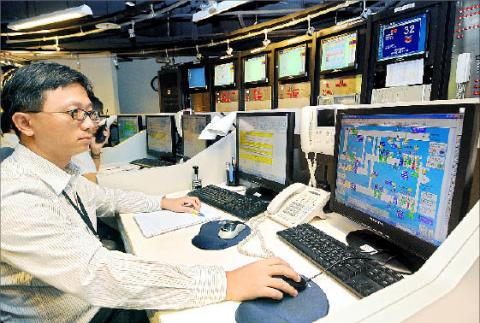Taipei 101 became the tallest building in the world to receive Leadership in Energy and Environmental Design (LEED) Platinum Certification yesterday at an award ceremony in the building’s lobby.
In cooperation with SL+A International, EcoTech International and Siemens Limited Taiwan, staff at Taipei 101 worked for more than 20 months to implement changes that would allow the building to meet the increasingly stringent certification standards.
Developed by the US Green Building Council, LEED is the most widely used green building rating system in the world. Taipei 101 achieved the platinum level certification in the Existing Buildings: Operations and Maintenance category.

Photo: Fang Pin-chao, Taipei Times
With a total floor space of 357,721m2, 90 tenants and a day-time population of more than 10,000 people, the project posed a number of challenges to implement, not to mention the NT$60 million (US$2.08 million) price-tag.
However, it was well worth it, Taipei 101 officials said.
“We started improving energy efficiency in 2007 and in the three years to 2010, we have already made that money back. From now on, we expect to save NT$36 million or US$1.2 million each year on energy costs, compared to 2007 levels” said Cathy Yang (楊文琪), vice president of the tower division of Taipei 101.
As for the wider impact of the project, green building experts said the assumption was that only newly constructed buildings could meet LEED standards, but Taipei 101’s certification could be the “lighthouse” project leading the way for other existing buildings to follow suit.
“When a world celebrity building like [Taipei] 101 achieves the highest level of certification, you know that every tall building on the planet as well as every little building on the planet is going to be looking somehow to emulate the achievement,” Rob Watson, chairman, CEO and chief scientist of EcoTech International and the “father of the LEED” certification, said yesterday.
Mark MacCracken, chairman of the US Green Building Council, said the achievement by Taipei 101 at the platinum level has taken away the excuses from other buildings around the world for not being able to do so.
“[People would say] ‘oh, we can’t do that. We’re too tall, we’re too this, we have too many tenants,’ this sort of thing — that discussion is now off the table because of this building and I think that that’s the biggest statement this building has made for the industry,” MacCracken said.

TAKING STOCK: A Taiwanese cookware firm in Vietnam urged customers to assess inventory or place orders early so shipments can reach the US while tariffs are paused Taiwanese businesses in Vietnam are exploring alternatives after the White House imposed a 46 percent import duty on Vietnamese goods, following US President Donald Trump’s announcement of “reciprocal” tariffs on the US’ trading partners. Lo Shih-liang (羅世良), chairman of Brico Industry Co (裕茂工業), a Taiwanese company that manufactures cast iron cookware and stove components in Vietnam, said that more than 40 percent of his business was tied to the US market, describing the constant US policy shifts as an emotional roller coaster. “I work during the day and stay up all night watching the news. I’ve been following US news until 3am

Six years ago, LVMH’s billionaire CEO Bernard Arnault and US President Donald Trump cut the blue ribbon on a factory in rural Texas that would make designer handbags for Louis Vuitton, one of the world’s best-known luxury brands. However, since the high-profile opening, the factory has faced a host of problems limiting production, 11 former Louis Vuitton employees said. The site has consistently ranked among the worst-performing for Louis Vuitton globally, “significantly” underperforming other facilities, said three former Louis Vuitton workers and a senior industry source, who cited internal rankings shared with staff. The plant’s problems — which have not

TARIFF CONCERNS: The chipmaker cited global uncertainty from US tariffs and a weakening economic outlook, but said its Singapore expansion remains on track Vanguard International Semiconductor Corp (世界先進), a foundry service provider specializing in producing power management and display driver chips, yesterday withdrew its full-year revenue projection of moderate growth for this year, as escalating US tariff tensions raised uncertainty and concern about a potential economic recession. The Hsinchu-based chipmaker in February said revenues this year would grow mildly from last year based on improving supply chain inventory levels and market demand. At the time, it also anticipated gradual quarter revenue growth. However, the US’ sweeping tariff policy has upended the industry’s supply chains and weakened economic prospects for the world economy, it said. “Now

COLLABORATION: Given Taiwan’s key position in global supply chains, the US firm is discussing strategies with local partners and clients to deal with global uncertainties Advanced Micro Devices Inc (AMD) yesterday said it is meeting with local ecosystem partners, including Taiwan Semiconductor Manufacturing Co (TSMC, 台積電), to discuss strategies, including long-term manufacturing, to navigate uncertainties such as US tariffs, as Taiwan occupies an important position in global supply chains. AMD chief executive officer Lisa Su (蘇姿丰) told reporters that Taiwan is an important part of the chip designer’s ecosystem and she is discussing with partners and customers in Taiwan to forge strong collaborations on different areas during this critical period. AMD has just become the first artificial-intelligence (AI) server chip customer of TSMC to utilize its advanced